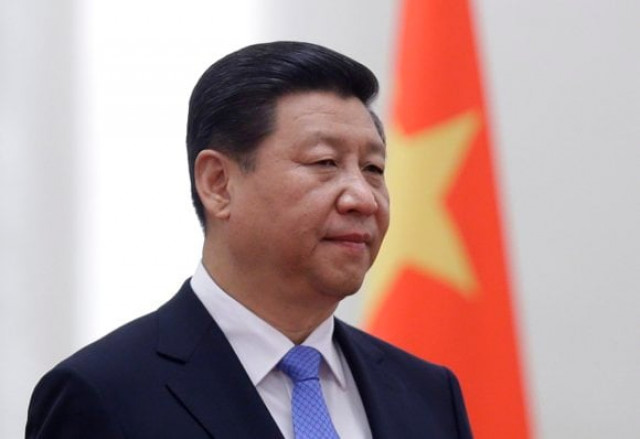China ‘striving for new world order’
Currently, China relies on the South China Sea for over 80% of its trade

China's President Xi Jinping. PHOTO: AFP
This is the story of China, which is poised to lead the world economy and by doing so lead the world literally. To achieve that, which many in the West consider China's ambitious plan, President Xi Jinping unveiled the ‘one belt, one road’ initiative to revive the silk route during his visit to Kazakhstan in 2013.
At Renmin University in Beijing, one of the top three universities in China, Professor Dr Wang Yiwei gave a rare insight into the initiative to a select group of Pakistani journalists who were on a study tour to Beijing and Shanghai.
Why ‘one belt, one road’?
Currently, China relies on the South China Sea for over 80% of its trade. Chinese shipping containers pass through a narrow strip in the Straits of Malacca where the United States military has a huge presence.
“This means we [China] need alternative routes,” explains Dr Wang, who is director of the Institute of International Affairs at Renmin University. This alternative is offered by Pakistan through its Gwadar port that connects China’s impoverished western regions to Central Asia and onwards to Europe.
But ‘one belt, one road’ initiative has caused concerns in the West, particularly in the United States. There are fears that China through its initiative will change the rules of the game as far as the world trade is concerned and may lead to confrontation among the big powers.
However, Dr Wang dismissed the perception, saying had China planned to confront anyone, its initiative would have not envisioned inclusion of India, which has publicly opposed the China-Pakistan Economic Corridor (CPEC).
The initiative proposes six corridors that include New Eurasian Land Bridge, China-Mongolia-Russia, China-Central Asia-West Asia, China-Indochina, China-Pakistan, and Bangladesh-China-India-Myanmar.
This plan would eventually connect 65 countries through air, road and sea for increased trade which, according to Dr Wang, would be to the tune of $2.5 trillion.
Chinese officials characteristically are known for being less forthcoming on such issues. But that approach seems to be changing.
Dr Wang, who is also working closely with the Chinese government on the ‘one belt, one road’ initiative, is candid enough to give a straightforward answer when asked whether Beijing was ready to set the new rules of the game for the world trade.
“Yes, China is striving for the new world order,” he said, adding that China as a world leader would be different from other superpowers, including the United States.
“’The one belt, one road’ initiative is China’s grand strategy of deepening its reform and opening up as well as practicing its ideas of win-win cooperation,” he argued insisting that unlike the United States, China will never invade any country nor interfere in others’ internal matters.
The initiative, he pointed out, is a long-term and systematic project which is aimed at building a community of shared interests, destiny and responsibility.
The underlining theme of this plan, Dr Wang says, is “peace, peace, peace. Inclusiveness, inclusiveness, inclusiveness, and prosperity, prosperity, prosperity. Like we in China say important things should be said thrice.”

But he listed the US and Nato confronting a resurging Russia, unrest in the Middle East and possible manipulation of terrorism by states as some of the main challenges facing China’s initiative.
Senior leader of China’s Communist Party Zhaq Qizheng agrees with this.
The 76-year-old, who is credited with turning Shanghai into one of the most modern cities of the world, minced no words in pointing finger at India for being a ‘tool’ of the United States to undermine China.
However, Zhaq, who is presently Chairman of the Foreign Affairs Committee of China’s Political Consultative Conference, has a friendly advice for Pakistan.
“You need to remove all terrorist groups and isolate their leadership to restore confidence of foreign investors,” the veteran Chinese leader who also served as the first governor of Pudong’s Shanghai district as well as its vice mayor.
For Zhaq, China and Pakistan have one similarity: both are victims of negative perception in the Western world. “We have proved them wrong with our self-belief and now it’s Pakistan’s turn to do the same.”
Professor Dr Wenshan Jia from the school of journalism and communications at Renmin University predicts that Pakistan can be next Singapore or South Korea if it takes full advantage of its potential using the ‘one belt, one road’ initiative.
Published in The Express Tribune, December 21st, 2016.


















COMMENTS
Comments are moderated and generally will be posted if they are on-topic and not abusive.
For more information, please see our Comments FAQ